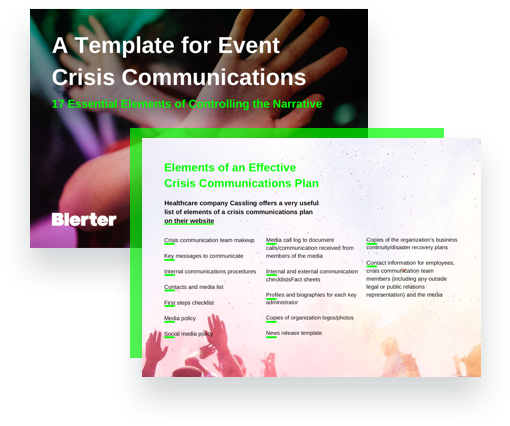A solid communication process is key for nailing that “effective event operations” stuff. And, it’s even better when the communication method you have in hand enables your whole event workforce to communicate through a single platform.
Seamlessly connecting your workforce through one channel might sound near impossible, but - don’t panic - there are tools out there to help you.
Putting a robust communications channel in place will empower your team to fulfil their roles effectively, will be invaluable in responding to incidents and will make your job a lot easier...which is always an added bonus.
So, let’s take a look at why an effective communication channel is so essential for successful event management and a few ways you can ensure you’re all over it.
![]()
As an event manager, having a good team of people around you is so important for the delivery of a successful event.
Livestrong break down in this article how and why communication is so valuable for good teamwork. And, what their research found was that there are a number of factors that are important for creating a successful team, but “good communication has shown to be the most important factor for success.”
So go get those communications channels sorted ASAP to help you effectively connect across your team and build a strong team dynamic that will help you smash your events.
As every event planner knows, you cannot plan for everything and you certainly cannot predict the future. So, you’re not expected to know when something will happen that needs a fast response and clear, concise communication out to a wide group of people. Therefore, your best method of preparation is having good mitigation plans in place for all your identified risks. And, a solid method of communication to activate those plans and coordinate responses effectively.
Following the devastating shootings at Marjory Stoneman Douglas High School in Parkland, and the loss Texas suffered during the mass shooting at Santa Fe High School, Captain Rick Francis of the Seminole County Sheriff’s Office shared this statement:
“Here are the hard facts. Virtually all the ‘after incident reports’ share a common theme. Communications problems and the inability of the school and law enforcement agencies to coordinate is repeatedly cited as a major response failure and source of costly time delays and inaction.”
This is sad proof of how a lack of communication hindered the ability to coordinate a timely response. And, although in this circumstance it was not at “an event”, we’re all aware of times it has been. It endorses that you can’t predict if, when, or how something like this will happen. Nor can you be 100% prepared. BUT, having a solid communications infrastructure in place will enable you to respond and deal with situations that arise quickly and effectively, hopefully mitigating the outcome.
It’s crucial your communication channel isn’t just a tool to send out information, but a place the rest of your event workforce can respond and share information too. This is important for updating everyone on what needs to be done and actioning tasks . Plus, it means information can be clarified or more information can be requested if something is unclear.
Communicating through one platform will help make sure everyone’s receiving the information they need, nothing gets missed and you have visibility right across your event. Once you’ve put the infrastructure in place, it’s important to encourage everyone to use it, otherwise it’s not going to achieve its objective of effective communications.
Operations tools like Blerter can be a great solution to this. You can connect entire event workforces through a single, simple-to-use platform that’s also recorded so you can review the communications and tasks carried out around incidents, post event.
With one channel to communicate through, a lot of people and no doubt a lot of activity, it’s easy to see how the channel could get confusing. By sharing important information prior to the event, including individual’s roles and responsibilities, it will be clear who is responsible for particular areas so they know when it’s their role to communicate out to the wider team and action particular tasks. This will help avoid too much back and forth which clutters the channel.
“Communication is key”, is a statement you will have heard in pretty much every article you read about effective event management. And that’s because it’s so true. But good communications don’t just happen when you have huge event teams and a tribe of volunteers, partners and suppliers. Successful communications stem from an efficient, simple-to-use communications channel and a solid communications strategy.
Talk to us today about how Blerter can improve your communications infrastructure at your events, helping you to create a successful event team that smash events.

Streamline your delivery, be prepared for things that can go wrong and increase crew engagement at your next event.